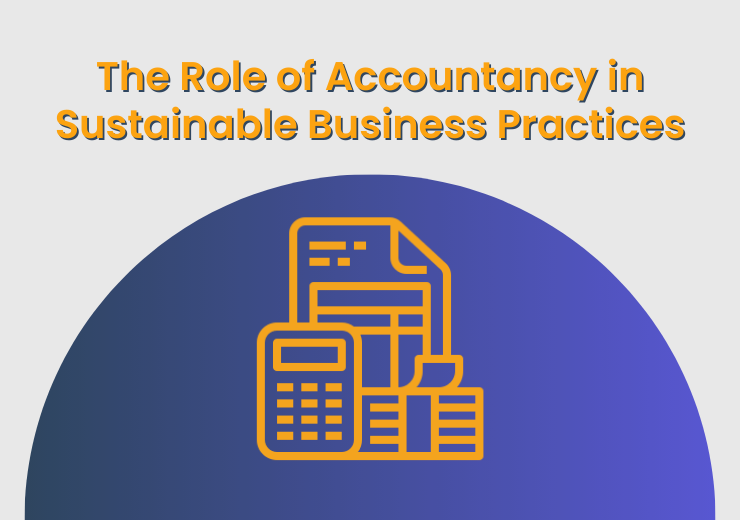Accountancy, often referred to as accounting, plays a crucial role in promoting and implementing sustainable business practices. Sustainable business practices focus on balancing economic growth, environmental stewardship, and social responsibility to ensure long-term success while minimizing negative impacts on the planet and society. Accountants and accounting practices are essential in achieving and measuring sustainability goals. Here’s how accountancy contributes to sustainable business practices:
- Financial Reporting and Transparency: Accountants are responsible for preparing financial statements, which provide stakeholders with essential information about a company’s financial performance and position. In the context of sustainability, this transparency helps investors, customers, and regulatory bodies assess how well a company is managing its resources and whether it is committed to sustainable practices.
- Cost-Benefit Analysis: Accountants help companies analyze the costs and benefits associated with sustainability initiatives. This includes assessing the financial implications of eco-friendly practices, such as investing in renewable energy sources, energy-efficient technologies, or waste reduction. Through cost-benefit analysis, businesses can make informed decisions about the sustainability projects they should undertake.
- Environmental Accounting: Environmental accounting is a specialized field within accounting that focuses on tracking and reporting a company’s environmental impact. Accountants use methods like Life Cycle Assessment (LCA) to measure the environmental effects of a product or process. This information is valuable for businesses aiming to reduce their carbon footprint and minimize waste.
- Carbon Accounting: Carbon accounting involves calculating a company’s greenhouse gas emissions and its efforts to reduce them. Accountants assist in collecting data, calculating emissions, and ensuring compliance with regulatory requirements. This data is crucial for businesses committed to reducing their carbon emissions and meeting sustainability targets.
- Risk Management: Accountants also play a vital role in identifying and managing risks related to sustainability. They help businesses assess the financial and reputational risks associated with environmental and social issues. This includes issues like climate change, supply chain disruptions, and changing consumer preferences, which can impact a company’s long-term sustainability.
- Performance Metrics and Key Performance Indicators (KPIs): Accountants develop and track sustainability KPIs, which help organizations measure and manage their progress toward sustainability goals. These KPIs often include metrics related to energy consumption, waste reduction, water usage, and social responsibility efforts.
- Integrated Reporting: Some companies are adopting integrated reporting, which combines financial and sustainability information into a single report. Accountants are instrumental in creating these reports, which offer a holistic view of a company’s performance in terms of both financial success and sustainability efforts.
- Tax Incentives and Credits: Accountants can help businesses take advantage of tax incentives and credits for sustainability investments, such as renewable energy projects or energy-efficient upgrades. These incentives can reduce the financial burden of adopting sustainable practices.
- Audit and Assurance: Independent audits and assurance services provided by accountants can verify a company’s sustainability claims, enhancing the credibility of its sustainability reports and claims.
In conclusion, accountancy is an indispensable tool in the pursuit of sustainable business practices. Accountants provide the financial data, analysis, and expertise required to make informed decisions, set targets, and measure progress toward sustainability goals. By incorporating sustainability principles into their financial practices, businesses can achieve not only economic success but also a positive environmental and social impact, ensuring a more sustainable and responsible future for all.
FAQs
1. What is the role of accountancy in sustainable business practices?
- Accountancy plays a crucial role in sustainable business practices by providing financial reporting, cost-benefit analysis, and measuring the impact of environmental and social initiatives.
2. How does financial reporting contribute to sustainability?
- Financial reporting offers transparency and information about a company’s financial performance, helping stakeholders assess its commitment to sustainable practices.
3. What is environmental accounting, and why is it important?
- Environmental accounting involves tracking and reporting a company’s environmental impact. It’s vital for understanding a business’s ecological footprint and minimizing environmental harm.
4. How can accountants help companies reduce their carbon footprint?
- Accountants assist in calculating greenhouse gas emissions, complying with regulations, and identifying strategies to reduce carbon emissions through sustainable practices.
5. What role do accountants play in risk management for sustainability?
- Accountants help businesses assess financial and reputational risks related to sustainability, such as climate change, supply chain disruptions, and changing consumer preferences.
6. What are sustainability KPIs, and why are they essential?
- Sustainability Key Performance Indicators (KPIs) are metrics that measure and manage progress toward sustainability goals, including energy consumption, waste reduction, and social responsibility efforts.
7. What is integrated reporting, and how does it benefit businesses?
- Integrated reporting combines financial and sustainability information into a single report, offering a comprehensive view of a company’s financial success and sustainability efforts.
8. How can accountants assist businesses in taking advantage of tax incentives for sustainability?
- Accountants help companies leverage tax incentives and credits for sustainability investments, reducing the financial burden of adopting eco-friendly practices.
9. Why is independent audit and assurance important for sustainability reports?
- Independent audits and assurance services provided by accountants verify the credibility of a company’s sustainability claims, ensuring transparency and accuracy.

